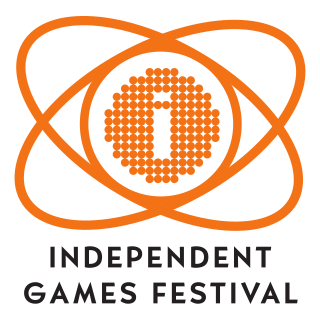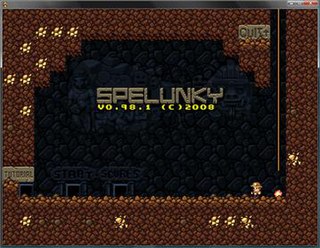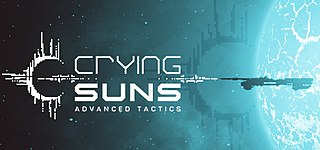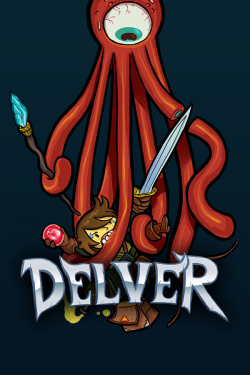
Roguelike is a style of role-playing game traditionally characterized by a dungeon crawl through procedurally generated levels, turn-based gameplay, grid-based movement, and permanent death of the player character. Most roguelikes are based on a high fantasy narrative, reflecting their influence from tabletop role-playing games such as Dungeons & Dragons.

The Independent Games Festival (IGF) is an annual festival at the Game Developers Conference (GDC), the largest annual gathering of the independent video game industry. Originally founded in 1998 to promote independent video game developers, and innovation in video game development by CMP Media, later known as UBM Technology Group, IGF is now owned by Informa after UBM's acquisition.

Digital Eel is a self-funded independent video game development team located in the Seattle, Washington area. Digital Eel is best known for its Infinite Space series of space roguelikes.
Dwarf Fortress is a construction and management simulation and roguelike indie video game created by Bay 12 Games. Available as freeware and in development since 2002, its first alpha version was released in 2006 and received attention for being a two-member project surviving solely on donations. The primary game mode is set in a procedurally generated fantasy world in which the player indirectly controls a group of dwarves, and attempts to construct a successful and wealthy fortress. Critics praised its complex and emergent gameplay but had mixed reactions to its difficulty. The game influenced Minecraft, Rimworld, and others, and was selected among other games to be featured in the Museum of Modern Art to show the history of video gaming in 2012.

An indie game, short for independent video game, is a video game created by individuals or smaller development teams without the financial and technical support of a large game publisher, in contrast to most "AAA" (triple-A) games. Because of their independence and freedom to develop, indie games often focus on innovation, experimental gameplay, and taking risks not usually afforded in AAA games. Indie games tend to be sold through digital distribution channels rather than at retail due to a lack of publisher support. The term is synonymous with that of independent music or independent film in those respective mediums.

Acquire Corp. is a Japanese video game developer and publisher, mainly known for their Tenchu and Way of the Samurai series. Acquire was founded on December 6, 1994, and in 1998 developed Tenchu: Stealth Assassins for the PlayStation, which turned into a franchise. The developer pushed for a more sandbox approach to the level design, which found its way in other Acquire titles like Way of the Samurai and Shinobido: Way of the Ninja. In 2011, the company was acquired by GungHo Online Entertainment. Acquire co-developed Octopath Traveler with Square Enix, releasing in 2018. Acquire was chosen as development partner for the game based on their affinity with pixel-art and prior work on the What Did I Do to Deserve This, My Lord? series. Acquire developed Katana Kami: A Way of the Samurai Story, which released in 2020, following the cancellation of a fifth Way of the Samurai entry. In 2024, the company was acquired by Kadokawa Corporation.

Spelunky is a 2008 source-available 2D platform game created by independent developer Derek Yu and released as freeware for Microsoft Windows. It was remade for the Xbox 360 in 2012, with ports of the new version following for various platforms, including back to Microsoft Windows. The player controls a spelunker who explores a series of caves while collecting treasure, saving damsels, fighting enemies, and dodging traps. The caves are procedurally generated, making each run-through of the game unique.
Iikka Keränen, a native of Finland, lives in Seattle, Washington with his dog. He is a level designer at Valve. He also co-founded Digital Eel, an independent video game development group, in 2001. His range of professional skills include illustration, 2D game art, 3D modeling, programming and game design.
Western role-playing video games are role-playing video games developed in the Western world, including The Americas and Europe. They originated on mainframe university computer systems in the 1970s, were later popularized by titles such as Ultima and Wizardry in the early- to mid-1980s, and continue to be produced for modern home computer and video game console systems. The genre's "Golden Age" occurred in the mid- to late-1980s, and its popularity suffered a downturn in the mid-1990s as developers struggled to keep up with changing fashion, hardware evolution and increasing development costs. A later series of isometric role-playing games, published by Interplay Productions and Blizzard Entertainment, was developed over a longer time period and set new standards of production quality.

FTL: Faster Than Light is a real-time strategy roguelite game created by indie developer Subset Games, which was released for Microsoft Windows, macOS and Linux in September 2012. In the game, the player controls the crew of a single spacecraft, holding critical information to be delivered to an allied fleet, while being pursued by a large rebel fleet. The player must guide the spacecraft through eight sectors, each with planetary systems and events procedurally generated in a roguelike fashion, while facing rebel and other hostile forces, recruiting new crew, and outfitting and upgrading their ship. Combat takes place in pausable real time, and if the ship is destroyed or all of its crew lost, the game ends, forcing the player to restart with a new ship.

The Long Journey Home is a 2017 space exploration video game by Daedalic Entertainment for Windows, macOS, PlayStation 4, Xbox One, and Nintendo Switch.

No More Robots Ltd is a British video game publisher based in Manchester, England. The company was founded by Mike Rose, previously of publishing company tinyBuild, alongside investors Simon Carless and Jas Purewal. The publishing label originally found success with digital games Not Tonight and Descenders, and now works with various development studios for titles across PC and console gaming platforms.
A roguelike deck-building game is a hybrid genre of video games that combines the nature of deck-building card games with procedural-generated randomness from roguelike games.

Noita is a platform roguelike game developed by Nolla Games. Players control a sorcerer that can create and cast spells in order to defeat enemies named after Finnish mythological creatures. It was released in early access for Microsoft Windows on 24 September 2019. Noita left early access as the 1.0 version was released on 15 October 2020.
The Electronic Entertainment Experience 2021 was the 26th and final E3, during which hardware manufacturers, software developers, and publishers from the video game industry presented new and upcoming products. The event, organized by the Entertainment Software Association (ESA), ran as a virtual, online-only event with free access to all, from June 12–15, 2021.

Crying Suns is a 2019 roguelike strategy video game developed by Montpellier-based developer Alt Shift and published by Humble Bundle. The protagonist, space admiral Ellys Idaho, awakes in a cloning facility decades after the interstellar empire he fought for has collapsed, and travels the empire's galaxy in a battleship in search of answers why. The game is split into six chapters, with three sectors each; Idaho and his crew travel through each sector and its star systems to reach the sector exits while staying ahead of a pursuing threat. During the course of their travels, players battle other battleships in pausable real-time.

Delver is a 2018 first-person roguelike action dungeon crawler video game developed by Priority Interrupt. It was released for Microsoft Windows, macOS, and Linux on February 2, 2018.

Star Traders: Frontiers is a hybrid space trading and tactical role-playing game designed by Trese Brothers, a two-man independent video game studio. Players control a spaceship captain in an open world setting.













